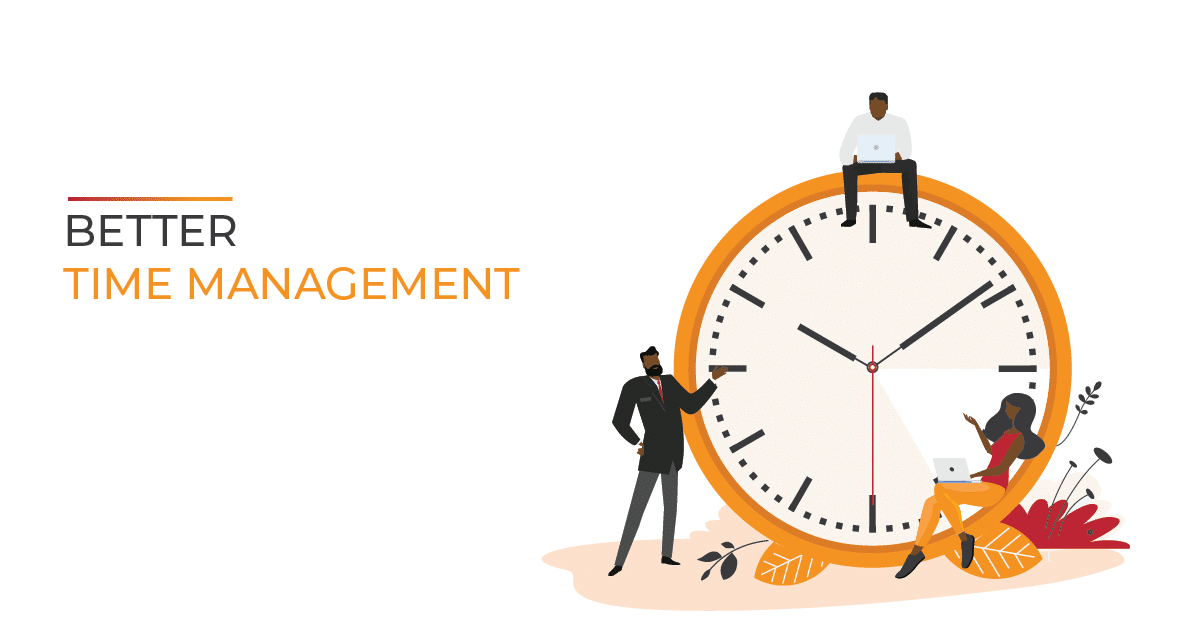We all know that person who always seems to have things under control. They always seem to get things done on time and even look like they have more time than everyone else. Then we also know of that person who always seems to be caught by surprise. They are always running around and never seem to have deadlines under control. The person seems busier than everyone else even if they are not necessarily the busiest around.
The difference between these two people is time management. Time management is defined as the ability to get things done on time without getting chased down by deadlines. It is the simple ability to organise your activities based on the time available to you such that you get things done in good time. This means that you are in control of your time and as such, you always have enough time for everything, including time for non-work matters.
If you have ever found yourself wondering what you really accomplished at the end of the day to make you feel so tired, it probably means you spent the better part of your day running around and not really accomplishing anything. If you constantly feel exhausted and overwhelmed, you definitely need to reorganise your time.
Here is how you can manage your time better and get everything done. You might even find yourself with some spare time!
Table of Contents
Know When Your are Most Productive and Get Things Done

We have all heard people say they are morning or evening people. What they simply mean is that they are most productive at certain times of the day. The reality is that you are most productive in the morning when your brain is fresh and you can think through things clearly. This means that you should carve out the morning to get the most important things done because it will be easier to get them covered when you are fresh.
This means that you get to knock out tasks that would otherwise rush you if you push them to later on in the day.
So, if you are struggling with time management, make a checklist of things that you need to do at the end of the day by order of priority and get them done in that order. You will realise that you get things done progressively and you seem to always stay ahead of your schedule. Most importantly, stick to the checklist and only make exceptions when absolutely necessary to avoid devoting time to activities which take up your time and but are not really important.
2. Allocate Time to Each Task
Granted, it may not always be possible to know how much time each task takes but you can work with a rough idea. This will help you determine how to go about your day, such that you do not get distracted by tasks that keep cropping up in the course of the day.
By all means, try and stick to the time allocated for each task to enable you to keep track of your time and avoid using the time allocated to one task to carry out another, as this only leads to poor time management. Proper utilisation of time allocated to each activity will help you stay on track with your activities, which will result in an ability to complete all your tasks on time and even have time to rest.
3. Take Stock of Your Time

If you constantly feel like you are always busy and never really getting anything done, then it probably means that your time is not being spent on things that you should actually be doing. Therefore, you will need to take an active role in determining what activities take up your time so that you are aware of what areas need change.
To do this, create a log where you enter the details of all your activities for the day. Be as detailed as possible and account for every minute by entering the exact activity that you do at any given time. After a week, conduct an analysis of these activities and see which activities take up much of your time and which ones don’t. You will also see those activities which take up your time and are not important.
With this information, you can reorganise your time by eliminating unnecessary activities and reallocating time to those activities which are important to your job. This helps you take control of your time by eliminating those activities that you do not need and managing those activities that are necessary. In the end, you will have more time available to work efficiently.
4. Find Out What You Can Automate
The age of automation is here with us and with it comes lots of conveniences and an ability to eliminate the mundane things that take up so much time. Automation helps you free up your time so that you can focus on things that matter.
The general rule is to automate those activities that are repetitive but which are important. Such tasks include making reports, which can be time-consuming, but which you have the ability to automate so that you are left with enough time to attend to other matters that require creativity. Therefore, if you are constantly running out of time to do the things that really matter, you should consider using automation to carve out more time in your day.
5. It is Okay to Say No

Interestingly, time can be spent on doing things that you do not necessarily have to do or which can wait. It may feel like you are not allowed to choose when to say yes and when to say no but this is exactly what makes it hard for you to take control of your time. You do not have to accept every request thrown your way because some of the requests simply take up your time and this will negatively affect your work.
Therefore, whenever a request lands on your desk, assess it and determine how important it is to you. You can choose to turn it down or attend to it later. If it is not urgent and important, do not bother dropping what you are doing to attend to it. Instead, slot it for a time that you are not too busy.
In a nutshell, we all have 24 hours in a day but the difference between those who always seem to have more time and get things done and those who always seem late is in time management.
Time management simply involves allocating time to various activities and it is in your best interest to optimise the time you have in your hands if you do not want to always be running around due to deadlines. Prioritising Your Tasks For Productivity
You just arrived at work and on opening your emails, you found several tasks that need your attention. At a glance, they all look urgent and important. Well, one thing is for sure, they are all important but are they really all urgent?
Sometimes work can be overwhelming, especially when there are so many things that need your attention. If you do not prioritise your tasks, you can end up feeling like you are constantly fighting fires and continuously falling behind your schedule. The truth is, chasing deadlines all the time can be draining and can lead to burning out. It can also cause you not to pay enough attention to your work, leading to sloppiness and stifling your creativity.

To work effectively, you need to compartmentalize your day and organise your tasks in order to allocate sufficient time and resources. This will result in improved productivity, as you will be able to attend to all your duties effectively. It will also reduce burnout as you will not be constantly chasing deadlines and feeling like everything is out of control.
Well, if this is you, there is a helpful tool known as the Eisenhower urgent/ important matrix that can be a great guide to organising your day. The matrix helps you understand what tasks to attend to at what time and in what order, such that you stop feeling like every task on your in-tray is urgent and needs your immediate attention. This is also known as compartmentalising and it helps you maximise your time.
Before we go to the Eisenhower matrix, just how can you learn how to compartmentalise your tasks?
1. Understand that not everything is urgent

Granted, all those tasks require your attention but the reality is, they do not all need your immediate attention. What this means is that you first need to realise that not everything in your in-tray should be sorted immediately.
By realising that not everything is urgent, you are able to attend to tasks in order of priority, which results in improved productivity due to a better focus on your tasks.
2. Allocate time to each task
Well, one way of staying organised is to ensure that you give time to each task such that when focusing on one task, you are not distracted by another. By doing this, you are simply ensuring that you do not give too much time to one task and limited time to another, which could cause you not to give some tasks enough attention.
At the end of the day, all your tasks are your responsibility and by allocating time, you are also unconsciously compartmentalising your job and deciding when to attend to each task. This also helps you not to feel like you are constantly running out of time to work on all the things that need your input.
3. Do not multitask

Despite common belief, no one is good at multitasking. Doing several things at the same time means that no task is getting your full attention and this reduces your productivity as you do not perform at your best. You may imagine that multitasking will help you kill several birds with one stone but the reality is, you might even take longer completing a task that you would have completed much faster had you focused on it alone.
Therefore, do not imagine that doing several things at once will help you clear your in-tray within a short time. It is only likely to make you sloppy and wear you out faster.
The Eisenhower Urgent / Important Principle
So, just how do you compartmentalise or organise your tasks for improved productivity? Well, one way of getting things done is to have a checklist that will help you list down the activities of the day and start working on them one by one.
However, this does not help you determine the order of priority of the tasks. To have a more effective way of managing your tasks, you should consider using the Eisenhower urgent/important principle. This will help you determine how to approach the tasks at hand. Here are the details of how the principle works.
1. Important and urgent tasks

One way of avoiding having urgent tasks always at your desk is by planning ahead so that you always have enough time to attend to all of them. However, there are those tasks that you can never foresee and which require your immediate attention. These are tasks that are critical and in some cases, involve putting out fires.
The general rule of thumb is to reduce your urgent and important tasks as much as possible but if not, then you have to attend to them as they come. These are typically tasks that can affect other people if they are not attended to and have a lot of value to the organisation.
They also affect other tasks and thus, keeping them pending could have a serious negative effect. Thus, they demand your immediate attention and the repercussions of not attending to them are immediate and can be fatal. The solution is to do them immediately.
2. Important but not urgent tasks
These are those tasks that have an impact on others and the organization but they can wait as their delay will not negatively impact others. These tasks come to you in good time and you, therefore, have enough time to attend to them. They may require some effort to complete but they can wait a bit longer. Thus, you basically have enough time to attend to them. Failure to complete them on time, however, graduates them to the important and urgent category so make time for them. Schedule such tasks based on how your day looks like.
3. Urgent but not important tasks
This may sound odd but there are tasks that need to be attended to urgently but they are not important. They should ideally not stress you out as their lack of completion does not have a significant negative impact. These are tasks that are basically about housekeeping, or administrative tasks such as submitting reports. They have consequences if not handled in good time but failure to handle them immediately will not have immediate consequences. However, they need to be attended to but not before the first two. If possible delegate these tasks as they do not necessarily require your direct attention.
4. Not urgent and not important
These are those tasks that simply land on your desk for you to decide what to do with them. They could be things such as taking surveys, which do not have a direct impact on your work. They are tasks that you can ignore or attend to when you have cleared all your tasks. Do not stress about them and if possible, you can ignore them.
Having a full in-tray can feel like you need to attend to every task right away. However, a deeper look at your tasks for the day can show you that not everything needs to be done now. This will help you create a plan to attend to each task at the right time, such that you do not feel like you are constantly running out of time. Use the Eisenhower urgent/important principle to help you organise your work such that you do not get burnt out by trying to get everything done at once.
How do you organise your tasks? Share with us.
Using Checklists To Boost Your Productivity
Accomplishing a goal or completing a task can be a very satisfying thing. It is an indication that your efforts have paid off and you are ready for the next big challenge. Our brains are wired to derive pleasure from wins because human beings are naturally competitive even if the competition is with oneself. Simply checking off a task on your to-do list has been shown to release dopamine in your brain, the feel-good hormone that is responsible for the excitement we feel for various things or reasons.
We all love accomplishments and checking off lists of things one is supposed to do brings a sense of excitement. Checklists are important because they help you keep track of the things you are supposed to do and alert you to the accomplishment of your tasks.
They also help you with prioritizing your work and keeping track of your progress, especially when you are handling many tasks and projects. So, if you are having many things to do at the same time, why not make use of checklists to stay motivated?
How to Make Check Lists
Most people do not know how to set up checklists. In many cases, people will simply write down the entire project or activity as a goal on the checklist. This can be discouraging, as it does not help you see that you are working towards achieving the overarching goal. Here is how to make an effective checklist.
1. Define the overall goal

The first step is to decide what is to be achieved in the long run. This will help you get a clear picture of what you are working towards and give you a rough idea of how to get there. Moreover, it will help you in the next steps below.
2. Break down the overall goal into tasks
Once you know what the goal is, you are able to define activities that will help you to achieve it. These act as milestones that help you work progressively towards the general goal. Write down the overall goal and then list the activities that you are to do so that you can achieve the goal. The list should move from the most basic to the final activity. This list is what you will check off as you work towards achieving the goal.
3. Keep track of the activities

Ensure that you stay committed to the activities, to help you get a sense of achievement. Ticking them off helps you feel good about yourself as you will see yourself progressively accomplishing the general goal. This has the effect of boosting your productivity, as it amounts to small wins.
4. Ensure that the activities are SMART
Smart stands for specific, measurable, achievable, realistic and time-bound. The tasks should be those that you can keep track of and know when they are complete. You should also allocate time for each task to help you stay committed and gauge yourself. This also helps you to pay attention to each activity and in case you need to rest, you can include it in the tasks.
Why Checklists Improve Your Productivity
1. Turns mundane exercises into fun activities

Just like in gaming, work is made fun by accomplishments. Games are made interesting by the ability to amass points as a person’s scores increase. The use of tasks broken down using checklists has the same effect as amassing points. It is an indication of accomplishments that eventually lead to greater achievement. For example, teams in the Premier League play different games throughout a season during which they amass points. These games are the equivalent of checklists in which the teams gain slowly as they work towards winning the main award.
2. They act as rewards
Obviously, you are not going to get rewarded for every task you complete or even get a compliment every time you complete a task. But, we all know that a compliment here and a ‘thumbs up’ there make you feel good about yourself and your work.
You can reward yourself each time you complete a task by having checklists that help you keep track of your progress. Everyone likes getting rewarded for their effort and checking off those activities is an act of reward that can significantly boost your productivity.
3. You train your brain to stay focused on the goal

Without a clear path to your goal, it can be easy to get distracted along the way and not even know whether you are making any progress at all. This can be discouraging and can lead to getting distracted and leaving the task mid-way, even if you are almost done.
However, with checklists that show the progress of your achievements, it becomes easy to stay focused as you can see your progress towards achieving the final goal. At the end of the day, your brain learns how to break down work into small tasks and stay focused until the entire job is completed.
4. Checklists make you organised

If for nothing else, checklists will help you remember every activity that you need to accomplish. When working in busy environments and when you have a lot of tasks at hand, some can get lost on the way, which will discourage you as you will seem like you are not committed to your job. With checklists, you learn how to organise your day and this helps you in accomplishing your tasks even if they seem a lot.
If you have a regular schedule, you can create a checklist that captures your daily activities and thus, helps you organise yourself for a long time. If you have trouble creating a schedule, there are online resources that provide templates and are customisable.
The use of checklists is something that everyone can benefit from and can help in boosting productivity. Apart from helping you make small wins and dissect large tasks into small, manageable activities, it can also help you organize your work. This helps you clear all your work progressively and can be a major boost to your productivity as it gives you a sense of accomplishment.
Do you use checklists? Let us know how they have helped you be more productive.
7 Major Distractions at Work that Kill Productivity
The modern workplace has come a long way in incorporating technology in daily organizational tasks to improve efficiency. There is still, however, no plausible solution for distractions that reduce productivity in the workplace. These distractions are mostly responsible for most time-wastage in the workplace and could be the reason why you need to work overtime to complete your daily tasks. The only way out is to identify them and try as much as possible to avoid them.
Here are the 7 major distractions at work that kill productivity
1. Social Media
This one is a big culprit. Obviously, the internet is a big temptation. What with all those notifications that keep popping up and that juicy update on a story you have been following? Salary.com in a study, reveals that a mere 20% of employee respondents said they do not visit non-work sites at work.
Solution: You can use a Google Chrome Add-On that allows users to set a limited amount of time on certain sites. When the time expires access to these sites is restricted.
2. Coworkers dropping by your desk

Collaboration with fellow employees is recommended in the workplace. However, these interactions should be geared toward solving problems and sharing ideas and should not supersede completing tasks or hitting targets. If you encourage people to keep dropping by to “pick your brains” or share an idea, you will not accomplish anything at the end of the day.
Solution: Wearing headphones can help signal that you are busy and don’t want to be disturbed.
3. Office Gossip
This is one of the most irresistible time-wasters in the workplace. It is also one of the most damaging ones. If not checked, office gossip can result in strained relationships and negative office politics.
Solution: Just avoid all forms of gossip in the workplace. It not only saves your precious time that should be spent hitting your targets but also steers you away from uncomfortable situations with your colleagues.
4. Meetings
While they are in good faith, meetings are considered big distractions. Most of what is discussed can be raised in collaborative chatting tools that will have all stakeholders giving their input.
Solution: The key is not to completely do away with meetings, but to reduce the number of times people need to discuss the same thing over. Also, setting an agenda and sticking to it is key in making meetings productive.
5. Noisy Coworkers

People are different. There are those who can successfully complete a task in a completely chaotic environment. There are those who even the slightest noise is enough to knock their thought process off course.
Solution: There should be measures in place to ensure the workspace is conducive for all. Everyone should understand that the office is no place to be excessively loud.
6. Snack and Smoke breaks
Breaks are essential for relaxation and to keep motivation flowing. Working continuously with no breaks is actually a health risk. However, if these breaks are taking huge chunks of your valuable time, they could be distractions limiting your workflow.
Solution: Cluster break activities so you do most of them at once. For instance, you can pick your snack from the fridge after your bathroom break so you don’t need to leave your desk twice. You can also spread out your breaks so that you accomplish substantial milestones in your workflow.
7. Workspace Arrangement

Where you sit and objects around you could be a major distraction. For instance, if you sit close to a window overlooking a busy highway or you are seated directly opposite the main door and always have to look up when there’s movement near the door, it could be a distraction.
Solution: Raise it with your supervisor if you feel your seating location is affecting your concentration.





